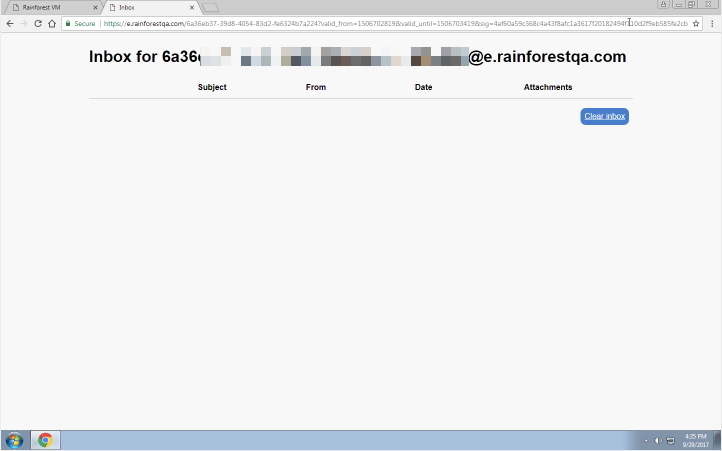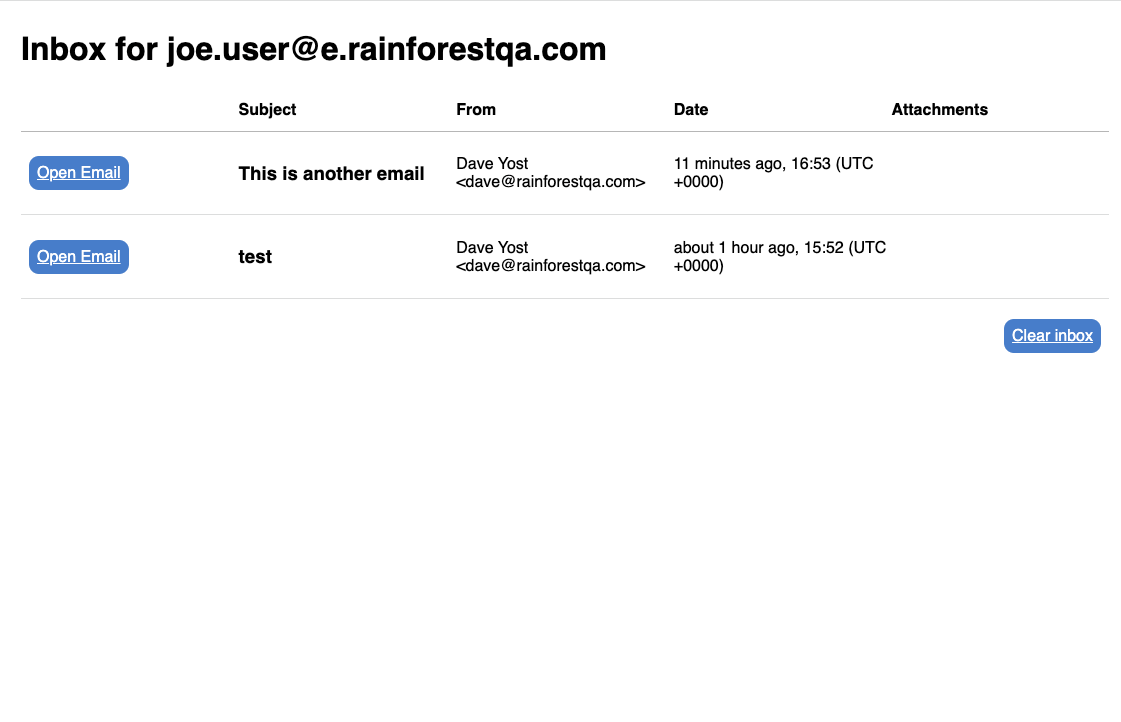Using Test Emails
Learn how to use and review the Rainforest QA email system.
Overview
When creating tests, you can send an email to an @e.rainforestqa.com address. This feature is useful for use cases such as authorization and confirmation. Moreover, you can also use the detailed information Rainforest captures to help with debugging.
Test Sending an Email from Your App to the User
Use {{random.inbox}} with {{random.email}} to test email verification.
{{random.email}}. This placeholder gives each of your tests a globally unique email address. It’s great for testing signup flows. Any email sent to {{random.email}} appears in its corresponding {{random.inbox}}.
{{random.inbox}}. This is a temporary, web-based email inbox similar to Mailinator.

A {{random.inbox}} example.
Review delivery by performing the following steps:
- Navigate to
{{random.inbox}}. - The page displays a list of all emails sent to the address in the last 30 days.
- Choose the email you want to investigate by clicking the Open Email button.
- The page displays detailed information, including timestamped events.

Email delivery details and timestamps.
Emails older than 30 days are automatically deleted from the inbox.
Use the placeholder {{random.email}} wherever a step is required to enter an email address in your app. Then, when you want to check whether the email was successfully sent, create a step to navigate to {{random.inbox}} and confirm the email is there.
You can write steps to clear the inbox. To do so:
- Navigate to
{{random.inbox}} - Click the Clear Inbox button
Customizing Rainforest Email Addresses
Some testing scenarios might require the use of emails that you create, this is possible using our inbox. To create a customized email please ensure it uses the below guidelines
- The email must end in e.rainforestqa.com.
- The email can not be over 254 characters.
- The email can only contain the following: Letters A-Z, Numbers 0-9, and Special Characters . -_
Customized Email ExampleIf you are testing a new login feature and want specific emails to track the flow: [email protected]
Create Multiple Unique Email Addresses
Some workflows require testing multiple email addresses in a test. For example, {{random.email}}, which is typically used to provide a test with a randomly generated email, provides a single email. However, for workflows requiring 2 or more unique email addresses, you can create a second email by combining two or more placeholders.
ExampleCombine
random.firstname,random.password, and “@e.rainforestqa.com” to produceResult: “[email protected]”
Instruct the test to access the inbox using the URL, which in this case is:
http://e.rainforestqa.com/Rockmany2ehSMZ6Append characters to create additional random emails.
For example,
{random.firstname}{random.password}[email protected] and{random.firstname}{random.password}[email protected].Result: Rockmany2ehSMZ61@e.rainforestqa.com and Rockmany2ehSMZ62@e.rainforestqa.com, respectively.
For the inboxes use
http://e.rainforestqa.com/{{random.firstname}}{{random.password}}1 and http://e.rainforestqa.com/{{random.firstname}}{{random.password}}2.Instruct the test to access the inboxes using the URLs, which in these examples will be:
http://e.rainforestqa.com/Rockmany2ehSMZ61 and http://e.rainforestqa.com/Rockmany2ehSMZ62.
If you have any questions, reach out to us at [email protected].
Updated 5 months ago
